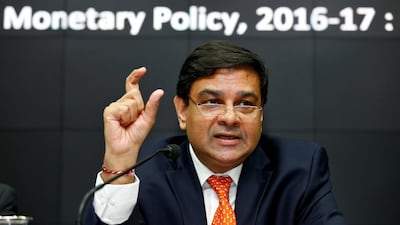India’s new central bank governor Urjit Patel led a united monetary policy panel to lower interest rates at its first review against the majority forecast of private economists.
The benchmark was lowered to 6.25 per cent from 6.5 per cent, the Reserve Bank of India said. That is the lowest since January 2011. The move was predicted by 16 of 39 economists in a survey, with one seeing a cut to 6 per cent and the rest forecasting no change.
“They are comfortable on inflation and they took action when they deemed right, even though markets expected otherwise,” said Radhika Rao, an economist at DBS Bank in Singapore.
The decision gives a first glimpse into the thinking of the recently established six-member panel under Mr Patel, who took over from Raghuram Rajan last month. While lower borrowing costs could ease ties with the government of the prime minister Narendra Modi, room for further reductions will be limited as the central bank seeks to meet its inflation target.
The benchmark S&P BSE Sensex held gains at 0.2 per cent after the central bank’s decision mid-afternoon in Mumbai. After initial euphoria, the yield on the 10-year benchmark note fell two basis points to 6.76 per cent from 6.78 per cent, and the rupee was up 0.2 per cent at 18.1146 per dollar.
“On balance, the committee envisages a trajectory taking headline CPI inflation towards a central tendency of 5 per cent by March 2017, with risks tilted to the upside” though not as high as flagged in August, the RBI said.
“This gives a very comforting feel to the market that inflation will remain subdued,” said Nikhil Johri, the chief investment officer at Trivantage Capital Management India. “There is scope for one to two more rate cuts in the next six months. That will keep the market positive and buoyant.”
While India is still the world’s fastest-growing big economy, expansion slowed in the three months through June amid anaemic investment and weakening consumption, complicating the outlook for Mr Modi, who is facing as many as seven state elections next year.
The country is also in the middle of geopolitical tensions after saying last week it attacked terrorist camps over the border in Pakistan, sending stocks and the rupee to their steepest drop in three months.
Still, the committee may not be able to repeat such monetary support. While inflation slowed more than estimated in August, a pay increase for civil servants could make the improvement short lived, complicating efforts to meet the goal of 4 per cent, plus or minus 2 percentage points
business@thenational.ae
Follow The National's Business section on Twitter

